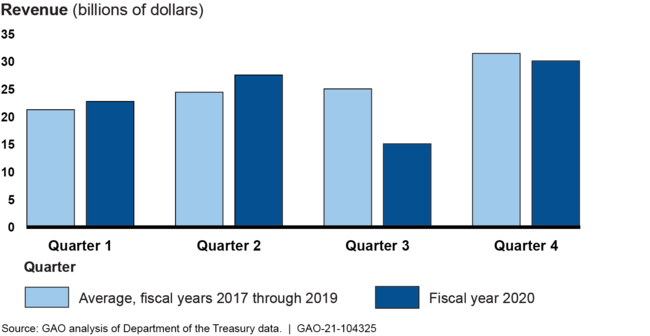COVID-19: Reviewing Existing Policies Could Help Selected Agencies Better Prepare for Dedicated User Fee Revenue Fluctuations
Fast Facts
Many federal agencies like the National Park Service and Federal Aviation Administration rely, in part, on user fees. In FY 2019, federal agencies collected over $100 billion in fees dedicated to specific purposes like park maintenance and airport improvements. We looked at how fee revenue changed during the COVID-19 pandemic and what some agencies did to respond.
Fee revenue declined in FY 2020 for 16 agencies. For example, revenue that pays for most FAA operations declined 43%. Agency responses included plans to prioritize funding of critical functions. We made 2 recommendations to better plan for future user fee disruptions.
Sign to Promote Social Distancing in Great Falls Park, Virginia

Highlights
What GAO Found
Executive branch agencies' revenues from dedicated user fees were lower in fiscal year 2020 and in the first half of fiscal year 2021 compared to average annual revenues in fiscal years 2017 through 2019, the 3 fiscal years prior to the start of the COVID-19 pandemic. Following the declaration of the pandemic as a national emergency in March 2020, these revenues were about 39 percent lower than the previous 3-year average during the same period.
Executive Branch Agencies' Revenue from Dedicated User Fees in Fiscal Year 2020 Was Lower Overall than the Previous 3-year Average

Note: For more details, see figure 2 in GAO-21-104325.
The Federal Aviation Administration (FAA), National Park Service (NPS), and U.S. Citizenship and Immigration Services (USCIS) all prioritized spending on essential expenses, sought to increase available funds or operational flexibilities, and relied on carryover balances to cover essential expenses during the pandemic. However, FAA and NPS have not documented plans to review certain management plans and policies.
- FAA drafted a cash management plan containing measures to help it carry out mission-critical functions in a time of Airport and Airway Trust Fund (AATF) revenue instability. FAA officials told GAO they may revisit the plan to align it with leadership priorities in case of future AATF revenue instability. However, FAA has not documented plans to conduct such a review, which could help FAA better prepare for future periods of revenue instability.
- NPS parks relied on funds carried over from previous years during the pandemic to various extents, depending on local circumstances. NPS requires many fee-collecting parks to carry over no more than 35 percent of the previous year's revenue from certain fees. The agency has not completed an analysis to determine the efficacy of this policy since its implementation in 2010. Because of this, NPS may not be maintaining its carryover balances in the most effective way.
Why GAO Did This Study
Each year, federal agencies collect billions of dollars in dedicated user fee revenue from fees charged to users of federal goods and services, which are dedicated by law for a specific purpose or program. The COVID-19 pandemic disrupted critical government operations for agencies that rely on these revenues.
The CARES Act included a provision for GAO to review the effects of the pandemic on public institutions of the U.S. This report examines how dedicated user fee revenues have changed since the onset of the pandemic and how selected agencies managed revenue changes related to the pandemic, among other objectives.
To determine revenue changes, GAO compared dedicated user fee revenues in fiscal years 2020 and 2021 to amounts from prior years. GAO selected three agencies to review—FAA, NPS, and USCIS—based on whether they relied on dedicated user fee revenue to a high (FAA and USCIS) or low (NPS) extent, among other factors. GAO interviewed officials at the selected agencies and reviewed relevant documents to determine how these agencies managed revenue changes, and compared those actions to internal control standards and leading practices for fee design.
Recommendations
GAO is recommending that FAA and NPS review their cash management plan and target carryover balance policy, respectively, and document processes to review the plan and policy in the future. The Departments of Transportation and the Interior concurred with GAO's recommendations.
Recommendations for Executive Action
| Agency Affected | Recommendation | Status |
|---|---|---|
| Federal Aviation Administration | The Administrator of the Federal Aviation Administration should review the agency's cash management plan to prepare for future periods of revenue instability. As part of this review, the agency should develop and document processes for future reviews of the cash management plan. (Recommendation 1) |
The Department of Transportation concurred with our recommendation. In April 2022, the Federal Aviation Administration (FAA) provided a guidance document that described processes and procedures for reviewing the agency's cash management plan. The process document described roles and responsibilities for reviewing the cash management plan, processes for making changes to the cash management plan, and processes for documenting and communicating the results of cash management plan reviews. According to the document, FAA plans to review its cash management plan annually or at any time there is a reasonable expectation that the Airport and Airway Trust Fund balance may be insufficient to cover FAA spending over the next 6 months. In October 2022, FAA officials completed their first annual review of the cash management plan. As described in FAA's April 2022 guidance document, each division within the Office of Budget and Programs reviewed the cash management plan, and the FAA Director of Budget and Programs and Chief Financial Officer both reviewed and approved the plan. Through these actions, FAA has addressed our recommendation to review its cash management plan and develop and document processes for future reviews of the plan.
|
| National Park Service | The Director of the National Park Service should document and implement plans to periodically review the agency's target rate for recreation fee carryover balances at individual park units. (Recommendation 2) |
The Department of the Interior concurred with our recommendation and, in response, in 2021 updated its policy to require the National Park Service's (NPS) Recreation Fee Program Office to annually review the agency's 35 percent carryover target rate for individual park units. NPS has conducted these reviews annually since fiscal year 2022. At the end of calendar year 2024, the agency analyzed the results of the past three reviews, along with the program's unobligated balances and the appropriateness of the 35 percent carryover target. As a result of this analysis, NPS determined in January 2025 that it did not need to modify the carryover policy. The agency stated that it will continue monitoring and evaluating the policy going forward. Through these actions, NPS has addressed our recommendation to periodically review the agency's target rate for recreation fee carryover balances at individual park units.
|
